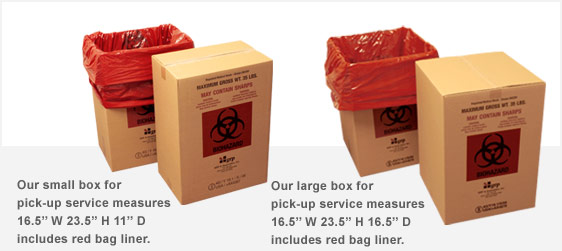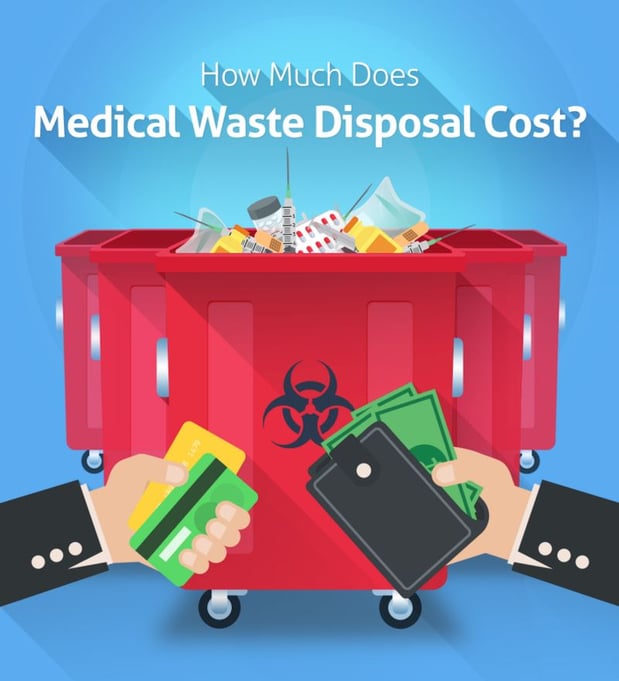Navigating Medical Waste Disposal: Important Solutions for Health Care Facilities
In the intricate landscape of health care operations, the administration of medical waste is an essential aspect that requires thorough focus. Health care facilities, whether tiny facilities or huge health centers, are delegated with the obligation of handling, treating, and disposing of a wide selection of clinical waste streams. The complexities associated with navigating via the regulative requirements, guaranteeing proper waste partition, and implementing secure collection and transport processes are critical. Recognizing the essential solutions that sustain medical waste disposal is not just a matter of conformity however also an essential element in safeguarding public wellness and ecological wellness. The ins and outs of this process are essential for medical care facilities, and the know-how provided in this world plays a crucial role in keeping the stability of healthcare systems.
Regulatory Compliance Support
For health care centers, making certain regulatory compliance assistance is necessary to keep proper handling and disposal of medical waste. Following policies established forth by companies such as the Epa (EPA) and the Occupational Safety And Security and Health Management (OSHA) is important to prevent ecological contamination, secure public wellness, and stay clear of potential legal consequences. Regulatory conformity assistance supplies healthcare centers with guidance on exactly how to appropriately segregate, shop, transportation, and dispose of different sorts of medical waste in accordance with local, state, and federal guidelines. This assistance consists of aid in creating and executing detailed waste monitoring strategies, carrying out normal team training sessions, and performing audits to make sure recurring conformity. By partnering with regulatory conformity professionals, healthcare centers can stay up-to-date on progressing guidelines, reduce risks related to incorrect waste disposal, and ultimately contribute to a much safer and much more sustainable environment for all.
Waste Partition Advice

Medical care facilities need to give clear guidelines and training to staff on exactly how to set apart waste efficiently. This includes separating basic waste from dangerous materials such as sharps, contagious waste, drugs, and chemical waste. Color-coded containers, tags, and signs are generally used to aid in waste partition techniques. Normal audits and tracking of waste partition procedures are important to identify any issues and make required enhancements.
Collection and Transport Solutions

Proper collection and transport services are crucial parts of the medical waste disposal procedure in health care centers. These solutions make certain that hazardous products are handled securely and in conformity with guidelines to shield both the setting and public health and wellness. Healthcare centers depend on specialized waste monitoring companies to supply reliable collection and transportation solutions tailored to their demands.
Medical waste collection entails segregating various kinds of waste at the point of generation, using color-coded bags or bins to differentiate in between general, unsafe, pharmaceutical, and other waste streams. Educated personnel must execute this task to protect against contamination and make sure proper disposal. Once accumulated, the waste is transported in specialized vehicles equipped to take care of harmful products safely. These automobiles abide by strict security standards and adhere to designated routes to certified therapy facilities for disposal with approaches such as landfilling, incineration, or sanitation.
Therapy and Disposal Solutions
In the world of clinical garbage disposal for medical care centers, after the essential stage of collection and transportation solutions, click over here now the focus moves towards applying efficient therapy and disposal solutions. Treatment options frequently include procedures such as autoclaving, which utilizes heavy steam under pressure to sterilize the waste. This method is typically used for infectious waste that must be rendered non-hazardous prior to disposal. An additional widespread therapy technique is incineration, where waste goes through heats in controlled settings to reduce its volume and eliminate virus.
Disposal options include the last action in the clinical waste monitoring process. Recycling and resource healing are also getting grip as sustainable disposal choices for specific kinds of clinical waste materials.
Efficient therapy and disposal options are critical in guaranteeing compliance with guidelines and guarding public wellness and the environment. Health care facilities need to meticulously evaluate and select proper methods that align with their waste management goals and sustainability initiatives.
Team Training and Education

To efficiently take care of medical garbage disposal in medical care centers, detailed staff training and education play an important role in guaranteeing adherence to governing needs and preserving a secure setting. Appropriate training gears up team with the expertise and skills required to deal with various sorts of medical waste, segregate them correctly, and package them safely for disposal. By informing employees on the threats connected with improper handling of clinical waste, facilities can reduce the chance of mishaps, contamination, and regulatory infractions.

Conclusion
Finally, healthcare centers depend on crucial medical garbage disposal services to guarantee regulative compliance, appropriate waste segregation, safe collection and transport, efficient treatment and disposal, in addition to company website team training and education. These services play a crucial role in maintaining the health and safety and security of both healthcare employees and the public, highlighting the value of appropriate management of medical waste in health care settings.
For healthcare centers, making certain regulative conformity support is vital to preserve proper handling and disposal of clinical waste. Waste segregation involves classifying various types of medical waste to ensure appropriate handling, treatment, and disposal. This consists of separating general waste from hazardous products such as sharps, transmittable waste, drugs, and chemical waste.Clinical waste collection involves setting apart various kinds of waste at the point of generation, making use of color-coded containers or bags to identify between basic, harmful, pharmaceutical, and various other waste streams.In the world of clinical waste disposal for medical care centers, after the critical stage of collection and transport solutions, the focus shifts towards implementing reliable treatment and disposal solutions.